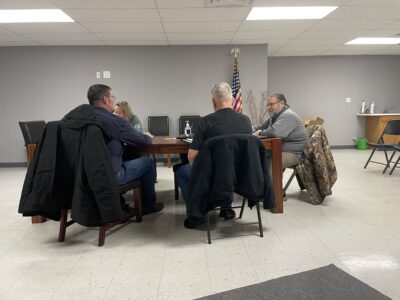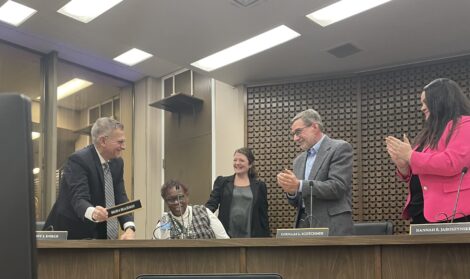Candidates Discuss Solutions For Drug Problem

PJ Wendel, left, and Norm Green
Editor’s note: This is the third of a four-part series of the candidates running for Chautauqua County executive.
Hundreds of thousands of dollars will soon be coming to Chautauqua County as part of the settlement reached with the manufacturers of opioids. The federal government says of the amount that will be received, 79% must be used to treat and address the opioid crisis.
Both candidates running for county executive say they’re committed to spending all of the money on the crisis, not just the 79%.
During a private debate with The Post-Journal and OBSERVER, County Executive PJ Wendel, a Republican, and Democratic challenger Norm Green were asked, “With the current drug problem in Chautauqua County and its impact on the quality of life for residents, what must be done to address this issue?”
Wendel noted that he’s seen the drug problem first hand as a volunteer firefighter, responding to overdoses.
Wendel has been a member of the Police Chiefs Association for the last four years. The group talks regularly and reaches out to the Sheriff’s Office, State Police, FBI and other groups. “The opportunity I have as part of the organization is I’m hearing first-hand what we are we doing,” he said.
The county’s Mental Health department has created a partnership with local law enforcement and providers throughout Chautauqua County. “Are drugs and mental health hand-in-hand? In some cases yes. But It’s that collaboration that working together that we’ve already started, has been successful,” he said.
Wendel noted that from the federal $24.6 million American Rescue Plan Act funds, the county is going to buy 40,000 Deterra bags. Residents who buy prescription pills can place the unused pills in the bag and the bag helps break them down with hot water so they can be properly disposed of. “That makes the drugs inert and takes away their opioid capabilities,” he said.
Wendel said he wants to pass a law that requires pharmacies that sell prescription drugs to hand out these Deterra bags when opioid medication is sold.
Before being elected county executive, Wendel was a teacher. He shared the story of one of his former students who graduated early, got out, became addicted and ended up overdosing. She now has a son who underweight, underdeveloped and has a myriad of issues. “Those are the things we have to prevent,” he said.
Although the final amount has not been settled, Chautauqua County has approved two different resolutions regarding opioid settlement funds. One resolution approves the county to receive between $426,000 to $996,000. The second resolution allows the county to receive between $2.4 million and $4.5 million over the next 18 years. Both resolutions state at least 79% must be spent on opioid treatment and awareness programs.
During one of the legislature’s meetings, County Legislator Terry Niebel, R-Sheridan, said he would like the remaining 21% be used to lower property taxes, something Wendel disagrees with. “I appreciate his efforts a ton as a fiscal conservative, but I don’t agree with Terry Niebel that we should use that money for property taxes. We need to focus on our opioid crisis, and that’s what we’re going to do,” he said during the debate.
Green would like to see more beds available for addicts who are struggling. “We need to make sure that people have somewhere to go to recover. Currently, we don’t have it in Chautauqua County,” he said.
Green shared how his father was a recovered alcoholic and sponsored hundreds of people in the county. “We need to have more access to Alcoholics Anonymous,” he said.
Green was critical of Wendel’s Deterra bag plan. “It’s interesting for a Republican to mandate, but we’re going to mandate that we’re going to hand out these Deterra bags to every pharmacist and every time you get a prescription, you’re going to hand out this bag. … I’m going to use the drugs to solve a problem but here I’ve got this Deterra bag. The truth is we need to do the system we’re doing right now and that is having places that take the drugs in and dispose of them properly,” he said.
Green believes people will just leave the bags in drawers at home and not dispose of their unused drugs. “This sounds crazy. It’s certainly a crazy use of this federal money. I just don’t see it,” he said.
Wendel scoffed at Green’s assertion that the Deterra bags are a crazy idea. “The Deterra bags are nationally known. They were handing them out at NACo (National Association of Counties), giving them to every attendee, saying ‘get these bags.’ Other counties have mandated this law,” he said.
Green challenged Wendel to commit to using the first settlement funds to get beds for those who are recovering addicts. Wendel said he wants to see the parameters and the final amount before making such a commitment but did pledge to use the settlement for treatment. “I do not approve of using that money for anything other than drug treatment. If it means beds, it means beds. If it means programs, it means programs,” said Wendel.
Green agreed as well to use all of the opioid money for drug treatment should he be elected county executive. “This is a serious problem. We all know people who have friends, who have children, who have relatives. We have a problem in Chautauqua County,” he said.






